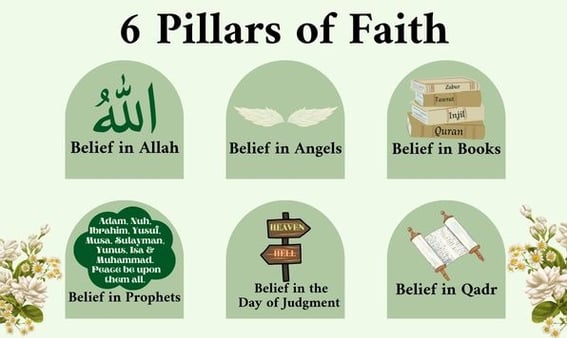The Six Pillars of Faith in Islam
Exploring the Six Pillars of Faith: A Guide for Children
8/29/20233 min read


Islam, one of the world's major religions, is founded on a set of fundamental beliefs that shape the lives of its followers. These beliefs, known as the Six Pillars of Faith, provide the foundation for a Muslim's spiritual journey. In this beginner-friendly guide, we'll explore these pillars, which are central to understanding the core tenets of Islam.
1. Belief in Allah (Tawhid)
The first pillar of faith in Islam is the belief in Allah, the one and only God. Muslims are monotheists, meaning they worship and believe in the existence of a single, all-powerful deity. This belief, known as Tawhid, is at the heart of Islamic theology. Allah is often described as merciful, compassionate, and just. Muslims believe that Allah is the Creator of everything in the universe, the Sustainer of life, and the ultimate source of guidance. This belief in the oneness of Allah forms the foundation of the Islamic faith.
2. Belief in Angels (Mala'ika)
The second pillar of faith encompasses belief in angels, supernatural beings created by Allah. Angels serve various roles, including delivering messages from Allah to His prophets, recording human deeds, and acting as guardians. Among the most well-known angels are Jibril (Gabriel), who conveyed Allah's revelations to the prophets, and Israfil, who will blow the trumpet to announce the Day of Judgment.
3. Belief in Divine Books (Kutub)
Muslims believe that Allah has sent down divine books to guide humanity. These books include the Torah given to Prophet Moses, the Psalms given to Prophet David, the Gospel given to Prophet Jesus, and the Quran, the final and complete revelation sent to Prophet Muhammad (peace be upon them all). The Quran is considered the ultimate source of guidance for Muslims, containing teachings, stories, and laws that provide direction for all aspects of life. It emphasizes the importance of righteousness, justice, and compassion.
4. Belief in Prophets (Nabi)
Prophets are chosen individuals whom Allah selected to convey His message to humanity. These prophets served as role models and guides, teaching people about Allah's oneness and providing guidance on how to live a righteous life. Some of the prominent prophets in Islam include Adam, Noah, Abraham, Moses, Jesus, and Muhammad (peace be upon them all). Prophet Muhammad is considered the final prophet, and his teachings, recorded in the Quran and Hadith (sayings and actions), provide the framework for Islamic practice.
5. Belief in the Day of Judgment (Qiyamah)
Muslims believe in the Day of Judgment, a day when all individuals will be resurrected and held accountable for their deeds. On this day, Allah will judge each person's actions, and they will be rewarded or punished accordingly. Belief in the Day of Judgment serves as a reminder of the importance of leading a righteous and ethical life. It motivates Muslims to perform good deeds, seek forgiveness for their sins, and strive for spiritual growth.
6. Belief in Predestination (Qadar)
The final pillar of faith is the belief in predestination, known as Qadar. Muslims believe that everything in the universe is under Allah's control, and He has knowledge of all things past, present, and future. While humans possess free will and are responsible for their choices, Allah's divine plan ultimately guides the course of events. This belief in predestination provides comfort to Muslims during times of hardship and reminds them to place their trust in Allah's wisdom and mercy.
The Six Pillars of Faith in Islam are the foundational beliefs that underpin the religion. They emphasize the oneness of Allah, the importance of divine guidance, and the ultimate accountability in the Hereafter. These pillars serve as a guide for Muslims in their daily lives, inspiring them to lead virtuous and purposeful lives. For beginners on the path of Islam, understanding and embracing these pillars is a significant step toward a deeper connection with the faith.
Islamic Blogs
Subscribe to our newsletter


COPYRIGHT © 2023 - 2025 Ilm Empowers Iman
Mugs
Daily Trackers/Planner
Tracing Books
Monthly Planners
Journals
